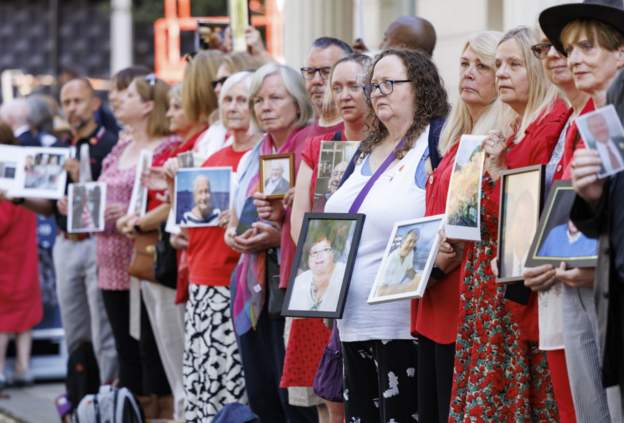By Ben Kerrigan-
A group of about 100 families from the Covid-19 Bereaved Families for Justice campaign group are holding a vigil outside where the inquiry is being held, and are unhappy about being excluded from the proceedings and prevented from sharing evidence.
“The inquiry’s inadequate “Every Story Matters” project and decision to only call up one of our 6,500 members to speak in the first module have been incredibly disappointing and hurtful.
“But far worse, they risk crucial learnings being missed, which could cost lives in the future.”
Some people say the involvement of bereaved families is important because of the loss they have suffered which can provide valuable insights into the human toll of the crisis and the effectiveness of government policies in safeguarding public health and minimizing harm.
Families of covid victims would have wanted an opportunity to share their stories, voice their concerns, and seek answers to their questions about the circumstances surrounding their loved ones’ deaths.
Celia Thomas, a 32 year old nurse from Epping told The Eye Of Media.Com: ”Understanding the personal narratives of bereaved families can also highlight the diverse experiences and challenges faced during the pandemic.
”Different regions, socio-economic backgrounds, and vulnerable populations may have experienced the impact of COVID-19 differently. By including bereaved families as witnesses, the inquiry can capture these nuances, contributing to a more comprehensive understanding of the pandemic’s effects.
.” Excluding bereaved families from the inquiry deprives the process of an emotional perspective, limits the understanding of the pandemic’s impact, and can be seen to undermine accountability, as well as alienating those most affected by the crisis.
Some of the problems highlighted to this publication with including bereaved families as witnesses in a COVID inquiry includes the challenge of having a representative sample of witnesses, coordinating testimonies, ensuring accessibility.
Nhs worker, Amber Smart Smart source said: ”Managing the emotional impact on families during the inquiry process can be complex and resource-intensive. Excluding bereaved families may help streamline the inquiry’s operations, allowing for more efficient gathering of evidence and analysis.
The inquiry is aimed at identifying systemic issues, gaps, and areas for improvement in the response to the pandemic and there are concerns that focusing primarily on individual stories may detract attention from broader systemic issues.
”There are also potential privacy concerns. Testimonies may delve into personal medical information, circumstances surrounding deaths, or other sensitive details. Balancing the need for transparency and accountability with respect for the privacy of individuals is likely a consideration in excluding families of the bereaved.
”It may help safeguard their privacy rights and prevent any unintended harm or distress caused by the public disclosure of personal and intimate details.
Image: PA

